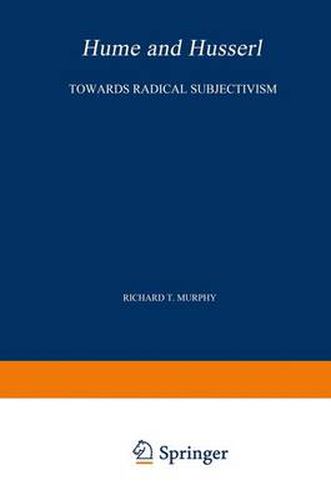Readings Newsletter
Become a Readings Member to make your shopping experience even easier.
Sign in or sign up for free!
You’re not far away from qualifying for FREE standard shipping within Australia
You’ve qualified for FREE standard shipping within Australia
The cart is loading…






This title is printed to order. This book may have been self-published. If so, we cannot guarantee the quality of the content. In the main most books will have gone through the editing process however some may not. We therefore suggest that you be aware of this before ordering this book. If in doubt check either the author or publisher’s details as we are unable to accept any returns unless they are faulty. Please contact us if you have any questions.
To become fully aware of the original and radical character of his transcendental phenomenology Edmund Husserl must be located within the historical tradition of Western philosophy. Although he was not a historian of philosophy, Husserl’s his torical reflections convinced him that phenomenology is the necessary culmination of a centuries-old endeavor and the solution to the contemporary crisis in European science and European humanity itself.l This teleological viewpoint re quires the commentator to consider the tradition of Western philosophy from Husserl’s own perspective. Husserl maintained that the Cartesian tum to the Cogito represents the crucial breakthrough in the historical advance of Western thought toward philosophy as rigorous science. Hence 2 he concentrated almost exclusively on the modem era. Much has been written of Husserl’s relationship to Descartes, Kant, and the neo-Kantians. His connections with Locke, Berkeley, and Hume have not been examined as closely despite his fre quent allusions to these British empiricists. Among these thinkers David Hume gained from Husserl the more extensive considera tion. Commentators have pointed out correctly that Husserl always criticized unsparingly Hume’s sheer empiricistic approach to the problem of cognition. Such an approach, in Husserl’s view, can only result in the naturalization of consciousness from which stem that psychologism and sensualism which lead Hume inevitably into the contradictory impasse of solipsism 3 and skepticism.
$9.00 standard shipping within Australia
FREE standard shipping within Australia for orders over $100.00
Express & International shipping calculated at checkout
This title is printed to order. This book may have been self-published. If so, we cannot guarantee the quality of the content. In the main most books will have gone through the editing process however some may not. We therefore suggest that you be aware of this before ordering this book. If in doubt check either the author or publisher’s details as we are unable to accept any returns unless they are faulty. Please contact us if you have any questions.
To become fully aware of the original and radical character of his transcendental phenomenology Edmund Husserl must be located within the historical tradition of Western philosophy. Although he was not a historian of philosophy, Husserl’s his torical reflections convinced him that phenomenology is the necessary culmination of a centuries-old endeavor and the solution to the contemporary crisis in European science and European humanity itself.l This teleological viewpoint re quires the commentator to consider the tradition of Western philosophy from Husserl’s own perspective. Husserl maintained that the Cartesian tum to the Cogito represents the crucial breakthrough in the historical advance of Western thought toward philosophy as rigorous science. Hence 2 he concentrated almost exclusively on the modem era. Much has been written of Husserl’s relationship to Descartes, Kant, and the neo-Kantians. His connections with Locke, Berkeley, and Hume have not been examined as closely despite his fre quent allusions to these British empiricists. Among these thinkers David Hume gained from Husserl the more extensive considera tion. Commentators have pointed out correctly that Husserl always criticized unsparingly Hume’s sheer empiricistic approach to the problem of cognition. Such an approach, in Husserl’s view, can only result in the naturalization of consciousness from which stem that psychologism and sensualism which lead Hume inevitably into the contradictory impasse of solipsism 3 and skepticism.